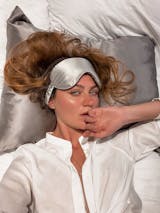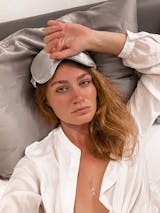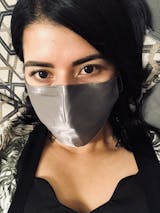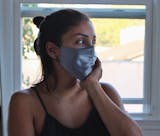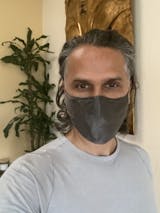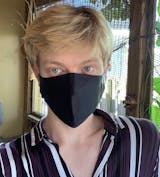In the pursuit of more glowing, radiant skin, we often find ourselves scouring the internet for information that tells us something new. While the information you find is often repetitive, there is truth to it, which is why it exists in the first place.
But some skincare tips aren't as widely talked about. This could be because blog writers are not necessarily skincare experts, or they are all sourcing their information from the same places. So we often see the same handful of skincare tips floating around.
So in today's article, I'll discuss the main factors that can affect our skin's health and appearance. And I'll highlight five lesser-known skincare secrets for your best skin.
What Can Affect Our Skin Negatively
We all want our skin to look its best. Many of us spend thousands of dollars every year trying to achieve this. However, there are many factors to consider before choosing a skincare ritual. These are:
- Genetics
- Diet
- Lifestyle
- Stress
- Environment
Genetics
It has to be said that no matter what we do, we will always be predisposed to our genetics. Skin conditions like acne are usually genetic and can be a nuisance when trying to get clear, glowing skin.
Unfortunately, we cannot change our genetics. But we can manage the symptoms caused by genetics through good habits, consistent skincare rituals, and sometimes even taking medication. If you suspect you have a genetic skin condition, I'd suggest seeing a dermatologist.
Diet
Our diet is what nourishes our bodies. If we feed ourselves only fake, processed foods, we risk becoming deficient in essential nutrients. Our body has seven main systems:
- Circulatory
- Digestive & Excretory
- Endocrine
- Integumentary/Exocrine
- Immune & Lymphatic
- Muscular
- Nervous
- Renal & Urinary
The Integumentary System consists of hair, nails, exocrine glands (sebaceous and ceruminous), and skin. A poor diet can create an imbalance within systems—including our Integumentary System. Autoimmune diseases, such as psoriasis can be exacerbated by eating certain foods, like gluten or dairy. This affects our immune system, our integumentary system, and ultimately our skin.
Poor diet is also linked to mental health problems, like depression and anxiety. So it's imperative to ensure you are nourishing your body with adequate nutrients to create a strong foundation for a happy mind, good health, and great skin.
Lifestyle
Tying into our dietary habits is also our lifestyle. Some key lifestyle habits that can affect your skin negatively are:
- Inactivity most of the day, ie. you work at a computer all day and rarely move around.
- Smoking cigarettes.
- Not sleep soundly or enough.
- Intentionally sun tanning or use a sunbed.
A sedentary lifestyle is linked to increased cardiovascular disease, diabetes, obesity, high blood pressure, colon cancer, osteoporosis, lipid disorders, anxiety, and depression. And if we spend all day on a computer screen, we also leave our skin open to blue-light damage, which damages our skin's cells.
Smoking cigarettes add toxins to your bloodstream, which damages collagen and elastin fibers found in the dermis layer of the skin. These fibers are essential for the skin to maintain a youthful appearance. Without collagen, our skin sags and loses plumpness. Smoking deprives our skin of nutrients, giving skin a lackluster and dull complexion, and is also linked to hair loss, cataracts, osteoporosis, heart disease, reproductive issues, early menopause, cancers, just to name a few.
Sleep is the most powerful thing we can do for our health and our skin. Studies show that most of us need between seven and nine hours of solid sleep every night for optimal mental and physical health. Sleep resets and rejuvenates our mind, body, spirit, and our skin. Our body does its best work in our sleep.
Sun tanning is a terrible lifestyle habit many of us partake in. The sun's UVA rays are what penetrate our skin and cause premature aging. UVB rays are what burn, give us a tan, and can cause skin cancers. So when we intentionally tan in the sun (or on a sunbed), we're exposed to both UVA and UVB rays. If you're a sun-lover, always remember to wear sunscreen and reapply throughout the day.
Stress
Stress is an emotional response that affects our nervous system, which can directly affect our physical being. Think about when you're stressed about something, like an exam. Do you experience stomach aches or diarrhea? In the same way it affects our digestion, our nervous system can also affect our skin.
Stress spikes our cortisol levels and triggers our corticotropin-releasing hormone (CRH), stimulating sebum production. When we produce excess sebum, we can often end up with acne.
Stress can also cause tension and headaches. When we have a headache, we tend to frown. If you're constantly under stress and always frowning, this can also form fine lines over time.
Environment
The environment we live in can affect our skin. City living has more pollutants in the air. Working on a computer screen emits blue light that can penetrate our dermis and cause cellular damage. Working outside exposes us to the sun's UV rays. There are endless environmental factors to consider before we treat our skin. But defining some of the key factors will help you choose the right skincare protocols so your skin will look great without the need for makeup.
5 Skincare Secrets to Great Skin
Once you have determined all of the factors in your life that could be affecting your skin, follow these five skin secrets to great skin.
Fortify Your Skin's Barrier
Our skin contains a three-layered protective barrier:
- Microbiome
- Acid Mantle
- Lipid Barrier
Each layer protects the skin from external aggressors. But when we cleanse too often, use the wrong products, over-exfoliate, or don't use enough products on our skin, it can break down these barriers. This should be your very first port of call.
How do you know your skin barrier is damaged? Look for these telltale signs:
- Rosacea
- Eczema
- Redness
- Inflammation
- Sensitivity to skincare products
- Itchy skin
- Dehydrated skin
- Dry skin
- Hyperpigmentation
- Infections and slow-healing
- Flaky skin
If you have any of these symptoms, your skin barrier most likely needs strengthening. Depending on the symptom, treatment will differ. But a good way to treat a damaged barrier is to stop using all skincare products and introduce a simple ritual of gentle products. Try this:
Cleanse: Sunshine Dew Cleansing Oil will gently emulsify impurities while keeping the skin's barrier intact. Use twice if wearing makeup. You may want to skip cleansing in the mornings if your skin feels too sensitive. This will allow your skin's barrier to repair naturally.
Tone: Calm Lavender Hydrosol Toner - this simple toner will keep irritation at bay while balancing the skin's pH.
Treat: Hyaluronic Acid Skin Soothing Serum - using a soothing serum brimming with skin-hydrators and protectants will strengthen and reinforce the skin's barrier.
Moisturize: Illume Radiance Enhancing Moisturizer - protect irritated and sensitive skin with a deeply nourishing moisturizer that contains reparative and antioxidant-rich botanicals.
Note: Do not exfoliate for at least two weeks.
Wear Mineral SPF Everyday
This isn't a big secret, but it's amazing how many of us still don't wear SPF, so I feel it's important to mention. UVA rays cause the most damage to our skin out of everything. They can penetrate deeply, wreaking havoc on a cellular level. The only way to minimize this is to stay in the shade, wear clothes that cover our skin or wear sunscreen.
But you may want to avoid using chemical sunscreens. As you may have read recently, some chemical sunscreens were removed from the market after being contaminated with possible carcinogens. Chemical sunscreens work by absorbing into the skin, where they absorb the sun's UV rays. This is why we're told to wear chemical sunscreens underneath our makeup and moisturizers so they can properly penetrate.
Chemical sunscreens are also known to be harmful to marine life. So I suggest you use a mineral sunscreen that sits on the surface of your skin and reflects UV rays. Try one of these:
Eclipse Sheer Mineral Sunscreen - this light and absorbent non-nano lotion contain zinc oxide (18.9%) for effective sun protection. Use it as the last step in a ritual.
Malu Day Cream SPF30 - this moisturizer is the perfect final step in the ritual, containing zinc oxide (12%), aloe leaf juice, and carnauba wax to soothe, protect, and nourish the skin.
Farizad's Veil Sun Reflector - already have a favorite moisturizer but don't have an SPF? Mix this powder with your moisturizer. It contains zinc oxide (94%) and a range of other botanicals to protect the skin.
Add Antioxidants
Add antioxidants to your skincare ritual and your diet. Antioxidants penetrate the skin and give up electrons to neutralize free radicals, like pollutants and UVA rays.
Antioxidants in Food: Antioxidants exist in foods that are red or blue, like berries; artichokes; dark chocolate (cacao 70%+); nuts; cruciferous vegetables; pumpkin; and spices, like cumin—just to name a few.
Antioxidants in Skincare: You'll find antioxidants in red algae; seaweed; cacao; mushrooms; Kakadu plum; sea buckthorn; berries; olives; coffee; citrus fruits; grapes; pumpkin seeds; sunflower seeds; rosehip; and Kamani.
There are many more antioxidant-rich ingredients out there. The key is always to eat real food and use high-quality skincare products.
Add one—or more—of these serums to your ritual for a boost of antioxidants:
Helios Anti-Pollution Youth Ampoule
Key Ingredients: grapeseed oil; cranberry; pomegranate; pumpkin seed; red algae astaxanthin; sweet orange.
Dew Drops Mushroom and Hyaluronic Acid and Vitamin C Serum
Key Ingredients: mushrooms; Kakadu plum; red algae; grape; orange peel.
Aurora Superfood Luminance Ampoule
Key Ingredients: grapeseed; seaweed; sea buckthorn; sunflower seeds.
Organic Face Serum with Coffee Oil
Key Ingredients: coffee; sea buckthorn; rosehip; raspberry; lemon.
Key Ingredients: sunflower seed; Kamani; cacao.
Oils are Your Best Friend
If there's one thing you can change in your life to improve your skin, it's using oils in place of cleansers and moisturizers—even if you have oily skin. Our skin has sebaceous glands everywhere, and this is where oil is produced to keep our skin healthy, hydrated, and malleable. Without oil, our skin would feel rough, rigid, dehydrated, and it would crack easily.
Particularly now that the weather is cooling down, why not swap your cleanser for a cleansing oil, like the Nourish Lavender and MCT Cleansing Oil, and finish your ritual every night with a facial oil, like 'Ōlena Beauty Oil? Doing this at night time will give your skin the much-needed nourishment while you sleep, so your skin will look great when you wake up.
Sleep
We spend a third of our lives sleeping. So ensuring you have a good night's sleep is the best way to help your skin look and feel rested and rejuvenated. Invest in high-quality, artisanal, and sustainably made silk.
Silk Sleeping Mask: This 100% pure organic silk eye mask is incredibly soft and gentle on the skin. Studies show that we sleep best when we don't have any interruptions from sounds or light. This mask effectively blocks all light pollution and stays comfortably on your face throughout the night. Silk also doesn't absorb your skincare products, so your nighttime rituals won't be wasted.
30-Momme Silk Bed Sheet Set: Melt into your bed every night with a silk bedding set. 30-momme silk is the highest weight of silk available on the market and is naturally hypoallergenic, antibacterial, and thermal-regulating, so you'll have a deep and restful slumber without being interrupted by allergies or overheating.
30-Momme Silk Pillowcase: If you don't need an entire bed sheet set, why not just invest in some silk pillowcases instead? These are made from the same 30-momme silk as the bed sheet set and are perfect for keeping hair smooth and tangle-free throughout the night. Select the silver ion-infused silk pillowcase at the checkout if you also suffer from breakouts. Silver ion technology is proven to reduce acne-causing bacteria by 99.97%.
Silk Blanket: Complete your bedding with a 100% silk blanket made from the finest Mulberry Silk. This blanket has all the same benefits as the silk bed sheets, but coming into the cooler months, it will keep you incredibly warm. Fall asleep, stay asleep and wake up with fresh, glowing skin every morning.
Fait avec Coeur's silk products are OEKO-TEX®, BSCI, and ISO certified.
Consistency is Key
The most important thing is to be consistent in all areas of your life if you want great skin. Having a solid ritual that you follow every day that includes a good diet, lifestyle, plenty of sleep, and being kind to your skin will give your skin the greatest opportunity to look its best.
Emma Jade has been a trained esthetician for over 15 years. She is a sustainable skincare writer, educating and building awareness around proper skin health that doesn't cost the Earth.
Some of the products promoted in our blog are from our online store. Many others are brands we have researched and found to be great examples of sustainable, ethical, and innovative brands in their field, and we don't profit from mentioning them in our blog. #CollaborationOverCompetition
References
- file:///Users/emmajade/Downloads/cosmetics-04-00011.pdf
- https://pubmed.ncbi.nlm.nih.gov/21185057/
- https://www.ewg.org/skindeep/ingredients/701741-CYCLOPENTASILOX-CYCLOPENTASILOXANE/




